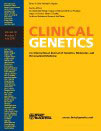Brožková D, Mazanec R, Haberlová J, Sakmaryová I, Seeman P. Clin Genet. 2010 Apr 20. IF: 3.304

Abstract:
Clinical and in silico evidence for and against pathogenicity of 11 new mutations in the MPZ gene. Mutations in the myelin protein zero (MPZ) gene are one of the frequent causes of Charcot-Marie-Tooth (CMT) hereditary neuropathies. Because the mutation rate of MPZ gene is rather high and some mutations are reported as polymorphisms, the proper clinical, electrophysiological examination and the segregation of the new mutation in larger families are crucial for the correct interpretation of the pathogenic or non-pathogenic character of each novel mutation. We examined 11 families with novel MPZ mutations. Eight of the mutations (L48Q, T65N, E97fs, G103W, P132T, T143R, V146G, c.645+1G>T) seem to be pathogenic on the basis of perfect segregation with the CMT phenotype and two (G213R and D246N), on the contrary, seem to be non-pathogenic/rare polymorphisms because they are present in healthy relatives. The character of the V46M mutation is difficult to interpret definitely; it may cause a sensory neuropathy or may also be a rare polymorphism. Phenotypes associated with each of the new mutations include severe hereditary motor and sensory neuropathy type III (HMSN III), and mild phenotype CMT1B presented mostly with only decreased or absent reflexes, foot deformities and mild or even absent atrophies in the lower limbs. Our report and careful family investigations with genotype-phenotype correlations should help to improve genetic counselling and correct interpretation of DNA testing results in further isolated patients or smaller families worldwide where these novel mutations might be found.
-az-
